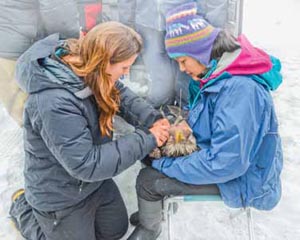Campus News
Uncommon People / Rachel Wheat and Yiwei Wang: Crowdsourcing for research
Grad students turn to a crowdfunding website to fund their bald eagle research.

The male bald eagle, 3C, left the Chilkat River in Alaska and flew 500 miles south to Kitimat, B.C., where he haunted a rugged landscape of rocky shorelines and old-growth forests.
What was revolutionary about 3C’s trip was not the distance or the destination, but rather the way UC Santa Cruz environmental studies grad students Rachel Wheat, 27, and Yiwei Wang, 30, were able to fund their tracking of him as part of their research on the influence of salmon on the ecosystem around the Chilkat in advance of a proposed sulfide mine there.
Instead of applying for a more-traditional grant from the National Science Foundation, which funds less than 20 percent of the requests it receives, Wheat and Wang turned to the crowdfunding website kickstarter.com. There, over a six-week period, they persuaded 100 people to contribute a total of $10,124 to subsidize four months of what they hope will become a larger study.
The two, who published a February article on crowdfunding in Trends in Ecology and Evolution, say the outreach needed to convince people to fund a wildlife study not only connects the public to research but also makes science more transparent.
About 30 unique visitors log onto the pair’s website daily to get front-row seats on scientific discovery, including the flight paths of four eagles equipped with GPS tracking devices and photos from 30 cameras, which capture images of grizzlies, mink, and marten that feed on the salmon.
With crucial help from UCSC Assistant Professor of Environmental Sciences Chris Wilmers, the two women hope their very public study will foster more interest in the ecosystem they are studying.
“We want people to care about the science we do,” says Wheat.